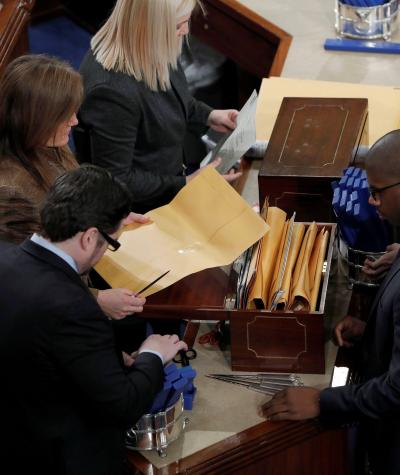In the last week, both chambers of Congress have taken significant steps toward updating the Electoral Count Act (ECA), an outdated law from 1887 that provides the primary legal framework for casting and counting Electoral College votes in presidential elections.
These developments are promising, as modernizing the ECA is an urgent priority that lawmakers must complete before the end of this year.
When Americans cast their votes for president and vice president, they do so indirectly by voting for their state’s slate of electors. Electors in each state then meet after Election Day to cast their votes in the Electoral College, and those votes are sent to Congress, which counts them to confirm the winner.
For more than a century, the ECA has set a timeline for selecting electors and transmitting their votes to Congress. The ECA also establishes procedures for how Congress counts the electoral votes and the role of the vice president, who presides over this process under the 12th Amendment as the president of the Senate.
However, the ECA has not been updated since it was first enacted more than 130 years ago, and it is rife with imprecise language, gaps and ambiguities that partisan actors attempted to exploit as part of an organized effort to overturn the 2020 election. Although this plan failed, the obscure language of the ECA remains ripe for manipulation.
That’s why updating the ECA to prevent future attempts at election manipulation is so important, and Campaign Legal Center (CLC) commends the bipartisan, bicameral efforts that are underway to address this archaic law’s most serious vulnerabilities.
Earlier this summer, a bipartisan group of senators, led by Sens. Susan Collins (R-ME) and Joe Manchin (D-WV), introduced the Electoral Count Reform Act (ECRA).
Soon thereafter, the U.S. Senate Committee on Rules and Administration held a hearing that demonstrated the widespread consensus among experts and across the political spectrum about how the ECA should be modernized.
This week, the Senate Rules Committee held a business meeting to advance the ECRA in the legislative process, adopting bipartisan amendments that strengthen the bill and setting the stage for a floor vote by the full Senate before the end of this year.
On the other side of the Capitol, Reps. Zoe Lofgren (D-CA) and Liz Cheney (R-WY) recently introduced a separate proposal to update the ECA, the Presidential Election Reform Act (PERA). In a sign of the urgency of this issue, their bipartisan legislation was then swiftly brought to the House floor, where lawmakers voted to pass the bill by a vote of 229-203.
The House and Senate bills are broadly similar, as both share four common goals:
- Prohibiting state legislatures from changing the law after Election Day to overrule their voters and the results of the popular election.
- Providing procedures to resolve disputes about electors and election certifications before those disputes reach Congress.
- Strictly limiting opportunities for members of Congress to second-guess states’ certified election results.
- Clarifying the vice president’s ministerial role in the counting of electoral votes and reinforcing that the vice president does not decide election results.
Although some differences exist in the approaches taken by both chambers to achieve these goals, CLC believes that the House and Senate’s common commitment to updating the ECA is the most important takeaway from these recent developments. Lawmakers have demonstrated a bipartisan and bicameral recognition of the need to update the ECA, and consensus is entirely possible.
A poll commissioned by CLC, Protect Democracy, Issue One and RepresentUS showed strong, bipartisan support among voters for updating the ECA. It also highlighted the serious concern held by a majority of voters (58%) that one party in Congress could try to overturn the results of an upcoming presidential election to put their own candidate in power.
With the 2024 election right around the corner, time is running out. The next presidential contest could be one of the most contentious ever, and an updated ECA is urgently needed to protect the will of the people. Congress must meet this moment; our democracy depends on it.

